Fred Neil | ||
| Allmusic Biography : Moody, bluesy, and melodic, Fred Neil was one of the most compelling folk-rockers to emerge from Greenwich Village in the mid-60s. His albums showcased his extraordinarily low, rich voice on intensely personal and reflective compositions, sounding like a cross between Tim Buckley and Tim Hardin. His influence was subtle but significant; before forming the Lovin Spoonful, John Sebastian played harmonica on Neils first album, which also featured guitarist Felix Pappalardi, who went on to produce Cream. The Jefferson Airplane featured Neils "Other Side of This Life" prominently in their concerts, and dedicated a couple of songs ("Ballad of You and Me and Pooneil" and "House at Pooneil Corner") to him. On the B-side of "Crying" is Neils "Candy Man," one of Roy Orbisons bluesiest efforts. Stephen Stills has mentioned Neil as an influence on his guitar playing. Most famously, Harry Nilsson took Neils "Everybodys Talkin" into the Top Ten as the theme to the movie Midnight Cowboy. For all his tangential influence, Neil himself remained an enigmatic, mysterious figure. His recorded output was formidable but sparse. During 1964 he recorded as a duo with Vince Martin, which yielded an album for Elektra, Tear Down the Walls. His drumless solo debut, Bleecker & MacDougal (which did have additional instruments), ranked as one of the best efforts from the era in which folk was just beginning its transition to folk-rock. The bluesiest of his albums, it contained some of his best songs, including "Little Bit of Rain," "Other Side of This Life," and "Candy Man." His true peak was his follow-up, Fred Neil, which made a full transition to electric instruments. Less bluesy in tenor, it featured "Everybodys Talkin," as well as an equal gem in "The Dolphins." Neils subsequent slide into obscurity was strange and quick. Sessions, from 1968, was a much more casual and slapdash affair that included some instrumental jamming. Always a recluse, he retreated to his home in Coconut Grove, FL, after achieving cult success, and didnt release anything after a live album in 1971. His obscurity was enforced by an absence of domestic compact-disc reissues of his best work, a situation rectified with a superb best-of compilation by Collectors Choice and the 2001 reissue of Tear Down the Walls/Bleecker & MacDougal by Elektra. He continued to play, but only for those close to him. Neil, ill with cancer, unexpectedly passed on July 7, 2001, at his home in Florida. | ||
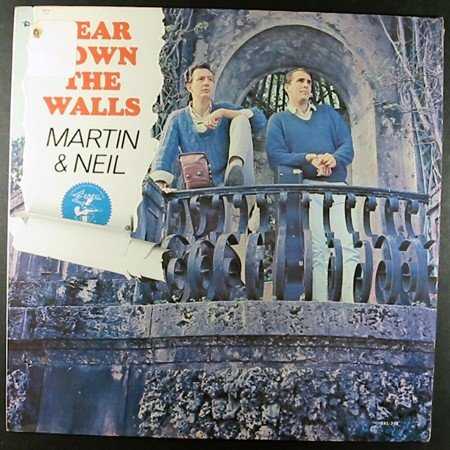 | Album: 1 of 6 Title: Tear Down the Walls Released: 1964 Tracks: 13 Duration: 00:00 Scroll: Up Down Top Bottom 25% 50% 75% Spotify Allmusic AlbumCover | 1 I Know You Rider (?) 2 Red Flowers (?) 3 Tear Down the Walls (?) 4 Weary Blues (?) 5 Toy Balloon (?) 6 Baby (?) 7 Morning Dew (?) 8 Im a Drifter (?) 9 Linin Track (?) 10 Wild Child in a World of Trouble (?) 11 Dade County Jail (?) 12 I Got em (?) 13 Lonesome Valley (?) |
| Tear Down the Walls : Allmusic album Review : Because of the renown achieved in later years by Fred Neil, it is easy to forget that his partner was much better known at the time Martin & Neil released their sole album in 1964. "Vince Martin With the Tarriers," as they were billed, had scored a Top Ten hit with "Cindy, Oh Cindy" in 1956. Martin possessed the sort of forceful tenor that enabled Glenn Yarbrough to lead the Limeliters to success, and he used it in a similarly dramatic way. It also provided a striking contrast to Neils bass-baritone. Martin & Neil came along at a time when commercial folk was showing a distinct social consciousness, and their style drew heavily on that of the massively popular Peter, Paul & Mary, particularly on the Neil-composed title song, with its stirring utopian tone ("one world in harmony"), and even Martins "Red Balloon," a childrens song in the tradition of "Puff the Magic Dragon" with some lyrics that later turned up in Jefferson Airplanes "Ballad of You and Me and Pooneil." Accompanied by Felix Pappalardi on the bass-like guitarron and John Sebastian on harmonica, the duo strummed 12-string acoustic guitars and used their strikingly different voices to reinvent traditional songs like "I Know You Rider" and "Lonesome Valley," popular covers like Bonnie Dobsons "Morning Dew," and some originals. Neils "Wild Child in a World of Trouble," which he sang alone, looked forward to his career as a solo singer/songwriter, which commenced not long after this album was released. After decades out of print, Tear Down the Walls reappeared in two configurations, as a European two-fer with Neils first solo album, Bleecker and MacDougal, credited to Neil alone and issued in the fall of 2001, and as a straight reissue from the mail order firm Collectors Choice Music in early 2002. | ||
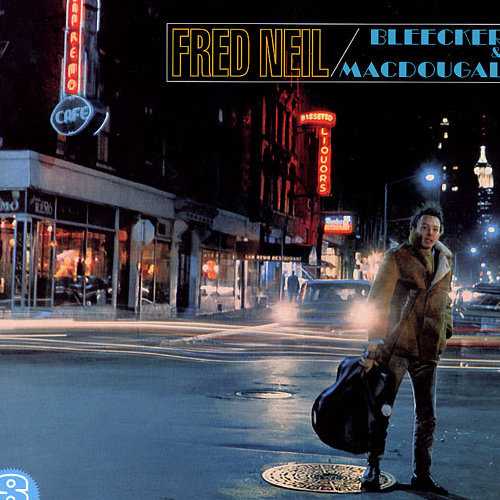 | Album: 2 of 6 Title: Bleecker & MacDougal Released: 1965 Tracks: 13 Duration: 34:10 Scroll: Up Down Top Bottom 25% 50% 75% Allmusic AlbumCover | 1 Bleecker & MacDougal (02:15) 2 Blues on the Ceiling (02:27) 3 Sweet Mama (02:39) 4 Little Bit of Rain (02:24) 5 Country Boy (02:28) 6 Other Side to This Life (02:58) 7 Mississippi Train (02:22) 8 Travelin Shoes (02:20) 9 The Water Is Wide (04:19) 10 Yonder Comes the Blues (01:53) 11 Candy Man (02:30) 12 Handful of Gimme (02:16) 13 Gone Again (03:14) |
| Bleecker & MacDougal : Allmusic album Review : Given the late Fred Neils near mythic reputation as a songwriter, singer, environmentalist, and recluse, the reissue of his 1965 album Bleecker & MacDougal is of historic importance. But rather than being an artifact of the man who wrote "Everybodys Talkin," "Other Side to This Life" (which appears here), and "Dolphins," this album is made of the material that gave Neil his enigmatic presence. This is a highly evocative and emotionally charged set of material, nearly all of which Neil composed. The lineup on the album was similar to his previous outing with Vince Martin, and featured John Sebastian on harmonica, Felix Pappalardi on bass, and guitarist Pete Childs (who also played dobro and electric on the date -- the latter was heresy for a folk record), with Neil playing 12-string. The pace of the set is devastating, from the greasy blues of the title track to the strolling darkness of "Blues on the Ceiling," the jug band stomp of "Sweet Mama," and the balladic heraldry of "Little Bit of Rain," a dynamic Tim Buckley would bring his own magic to as he emulated it a few years later. In addition, theres the tough Chicago blues meets California swagger of "Country Boy," which Mike Bloomfield and Paul Butterfield would perfect two scant years later. "Other Side to This Life" is its own elegiac painting in sound, with glistening dirge-like textures caressed by Neils baritone. The tough, battered "Travelin Shoes" is an early example of folk-rock with a big accent on the word "rock." Yet, on the albums lone cover, a gorgeously wrought and multi-textured rendition of "The Water Is Wide," Neil added spare, haunting jazz overtones to the arrangements, transcending the folk coffeehouse prison the song had been encased in for a decade. In fact, if one listens to Bryter Layter by Nick Drake, it would be easy to hear the connection. The album closes with the winding dobro that sparks "Gone Again," underlining the albums feeling of rambling transience and willful acceptance of both the graces and hardships life offers. In 13 songs, Neil transformed the folk genre into something wholly other yet not unfamiliar to itself, and helped pave the way for an entire generation of singer/songwriters who cared as much for the blues as they did for folk revival traditions. This is -- more so than his fine compilation The Many Sides of Fred Neil (also on Collectors Choice) or his debut Capitol album, Tear Down the Walls -- the Fred Neil record to have. | ||
 | Album: 3 of 6 Title: Fred Neil Released: 1967 Tracks: 10 Duration: 37:54 Scroll: Up Down Top Bottom 25% 50% 75% Spotify Allmusic AlbumCover | 1 The Dolphins (03:51) 2 Ive Got a Secret (Didnt We Shake That Sugaree) (04:35) 3 Thats the Bag Im In (03:33) 4 Ba-De-Da (03:35) 5 Faretheewell (Freds Tune) (04:00) 6 Everybodys Talkin (02:58) 7 Everything Happens (02:17) 8 Sweet Cocaine (02:03) 9 Green Rocky Road (03:35) 10 Cynicrustpetefredjohn Raga (07:27) |
| Fred Neil : Allmusic album Review : Fred Neils self-titled second album was a languid and fluid gem that continues to stand outside of time decades later. The beautifully sad, introspective songs of weary modern urban disaffection that Neil brought to these sessions in 1967 are among the best he ever wrote, and the perfectly balanced electric instrumentation suits them to a T. Neils calm, wearied basso vocals pull things along here at a decidedly unhurried pace, and the songs themselves seem to drift organically into being as he sings them, until listening to this album begins to feel like floating. And what songs! "The Dolphins" and "Everybodys Talkin" -- a huge hit in a cover version by Harry Nilsson -- are classics by anybodys definition, and Neils reconstruction of Libba Cottons "Shake Sugaree" as "Ive Got a Secret" is a perfect example of the folk process alive and well in a commercial recording studio. Neil had absolutely no interest in the business aspect of making music, though, and where most musicians seek the spotlight, he shunned it, which meant Fred Neil the album went nowhere commercially, although it influenced countless other artists. Long out of print, it is reissued here straight and unadorned, and while some bonus material would have been nice, it is such a perfect album as is, additional tracks may have tipped it out of balance. Fred Neil, all these years later, remains a haunting and reassuring masterpiece. | ||
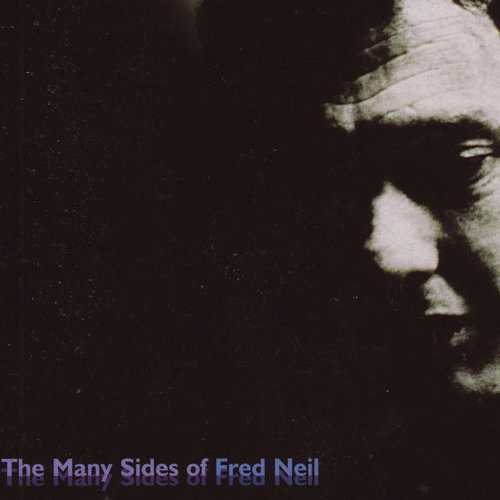 | Album: 4 of 6 Title: The Many Sides of Fred Neil Released: 1998 Tracks: 36 Duration: 2:34:24 Scroll: Up Down Top Bottom 25% 50% 75% Spotify Allmusic AlbumCover | 1 The Dolphins (04:05) 2 Ive Got a Secret (Didnt We Shake Sugaree) (04:38) 3 Thats the Bag Im In (03:33) 4 Ba-De-Da (03:38) 5 Faretheewell (Freds Tune) (04:01) 6 Everybodys Talkin (02:43) 7 Everything Happens (02:17) 8 Sweet Cocaine (02:03) 9 Green Rocky Road (03:40) 10 Cynicrustpetefredjohn Raga (08:12) 11 Felicity (02:12) 12 Please Send Me Someone to Love (03:36) 13 Merry Go Round (05:51) 14 Look Over Yonder (08:31) 15 Fools Are a Long Time Comin (05:19) 16 Looks Like Rain (07:16) 17 Roll on Rosie (08:25) 1 The Other Side of This Life (live) (03:07) 2 Roll on Rosie (live) (03:45) 3 The Dolphins (live) (04:35) 4 Thats the Bag Im In (live) (03:20) 5 Sweet Cocaine (live) (02:54) 6 Everybodys Talkin (live) (03:20) 7 Come Back Baby (feat. Les McCann) (02:36) 8 Ba-De-Da (feat. Vince Martin) (02:51) 9 Prettiest Train (04:14) 10 You Dont Miss Your Water (feat. Gram Parsons) (02:36) 11 Felicity (01:37) 12 Long Black Veil (feat. The Nashville Street Singers) (02:30) 13 Bottom of the Glass (feat. The Nashville Street Singers) (02:49) 14 Sweet Mama (05:17) 15 Trouble in Mind (05:02) 16 Decembers Dream (03:39) 17 Ride Stormy Weather (05:26) 18 How Long Blues/Drown in Tears (09:46) 19 The Other Side of this Life (04:43) |
| The Many Sides of Fred Neil : Allmusic album Review : For many, the name Fred Neil will be familiar only as that belonging to the songwriter of the modern classic "Everybodys Talkin," or perhaps "Candyman," "The Dolphins," or "Other Side of This Life," songs that Roy Orbison, Tim Buckley, and the Jefferson Airplane, respectively, recorded. However, Neils influence extends much farther. John Sebastian, David Crosby, Stephen Stills, and Bob Dylan all claimed him as an influence, since he blended traditional and contemporary folk, blues, rock, gospel, Indian, and pop influences into a distinctive, idiosyncratic style. His music was not only influential, it was quite rich on its own terms and some of the best music of its era. Unfortunately, since Neil chose a life of seclusion in 1971, disappearing from both recording and performing, his work was neglected. Remedying the situation, The Many Sides bypasses his Elektra material, instead offering a complete summary of his Capitol recordings, including his three albums for the label (Fred Neil, Sessions, Other Side of This Life), both sides of a non-LP single with the Nashville Street Singers, and six unreleased cuts. Its a long overdue compilation and one that certainly stands as a definitive portrait of an influential and criminally underappreciated folk-rock figure. After listening to The Many Sides of Fred Neil, it makes sense that Neil turned into a recluse -- this is moody, haunting music, unlike much of the work of his contemporaries. In particular, his eponymous album boasts challenging, innovative arrangments that remain fresh and startling to this day. The rest of his work may be a little uneven in comparison, but its frequently compelling and often matches its heights. Most importantly, The Many Sides of Fred Neil grants Neil his proper place in folk-rock history, confirming his unique vision and talent. | ||
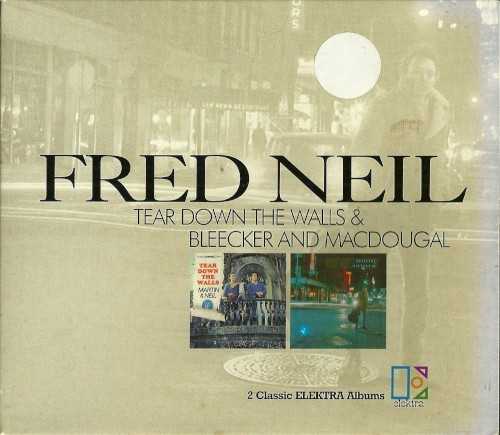 | Album: 5 of 6 Title: Tear Down the Walls / Bleecker & MacDougal Released: 2001 Tracks: 26 Duration: 1:14:30 Scroll: Up Down Top Bottom 25% 50% 75% Allmusic AlbumCover | 1 I Know You Rider (03:12) 2 Red Flowers (02:37) 3 Tear Down the Walls (02:38) 4 Weary Blues (04:16) 5 Toy Balloon (01:53) 6 Baby (04:34) 7 Morning Dew (04:13) 8 Im a Drifter (02:32) 9 Linin Track (02:41) 10 Wild Child in a World of Trouble (02:19) 11 Dade County Jail (03:04) 12 I Got em (03:09) 13 Lonesome Valley (03:07) 14 Bleecker & MacDougal (02:15) 15 Blues on the Ceiling (02:26) 16 Sweet Mama (02:39) 17 Little Bit of Rain (02:24) 18 Country Boy (02:29) 19 Other Side of This Life (02:58) 20 Mississippi Train (02:22) 21 Travelin Shoes (02:19) 22 The Water Is Wide (04:19) 23 Yonder Comes the Blues (01:53) 24 Candy Man (02:30) 25 Handful of Gimme (02:16) 26 Gone Again (03:14) |
| Tear Down the Walls / Bleecker & MacDougal : Allmusic album Review : Fred Neils two classic Elektra records albums assembled together on one CD, with new biographical notes supported by lots of photos, too. The CD is slightly uneven as a listening experience, mostly by virtue of the songs off of Tear Down the Walls, a hybrid work that has moments of inspired, heavyweight brilliance from Neil, compromised by the lighter-textured voice of Vince Martin, who almost always seems like hes trying hard to keep up with Neil and measure up to what his partner is doing. There are some brilliant songs, as the two slip into a serious blues groove on "Weary Blues"; soar together on the exultant, extended duet of "Baby" (which plays like an Indian raga with vocals); the darker-toned "Morning Dew"; and the driving, crunchy "Linin Track," which leads into "Wild Child in a World of Trouble." Interspersed among those splendors, however, are some more retro (even for 1964) and forced commercial efforts, including the title tune, the kind of optimistic early-60s folk number that mightve found its way into the repertory of the New Christy Minstrels or the Serendipity Singers, and Vince Martins "Toy Balloon," a song aimed at the subsidiary folk market for childrens songs (and which mightve worked very nicely in the hands of Peter, Paul & Mary). The 13 tracks off of Bleecker & MacDougal that follow are brilliant through and through, dark, serious, mostly blues-influenced originals that hold up infinitely better four decades later than anyone had a right to expect -- Bleecker & MacDougal is easily among the best records EVER issued by Elektra, and perhaps the best folk record ever put out by the label. Its all essential listening, and by themselves easily justify the $20 price of this European import -- the digital remastering is spot-on perfect, and the packaging and annotation give these two albums the treatment theyve always deserved. | ||
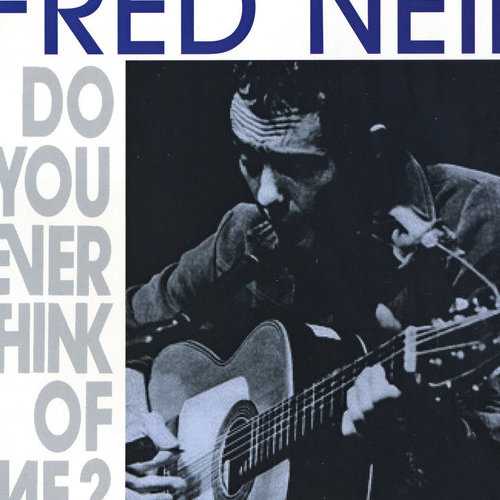 | Album: 6 of 6 Title: Do You Ever Think of Me? Released: 2003 Tracks: 17 Duration: 1:20:02 Scroll: Up Down Top Bottom 25% 50% 75% Allmusic AlbumCover | 1 The Dolphins (04:05) 2 Ive Got a Secret (Didnt We Shake Sugaree) (04:38) 3 Thats the Bag Im In (03:33) 4 Ba-De-Da (03:35) 5 Faretheewell (Freds Tune) (04:01) 6 Everybodys Talkin (02:43) 7 Everything Happens (02:17) 8 Sweet Cocaine (02:03) 9 Green Rocky Road (03:40) 10 Cynicrustpetefredjohn Raga (08:12) 11 Felicity (02:12) 12 Please Send Me Someone to Love (03:36) 13 Merry Go Round (05:51) 14 Look Over Yonder (08:31) 15 Fools Are a Long Time Comin (05:19) 16 Looks Like Rain (07:16) 17 Roll on Rosie (08:25) |
| Do You Ever Think of Me? : Allmusic album Review : Do You Ever Think of Me? contains the second and third solo albums by Fred Neil. The first ten tracks comprise Neils self-titled and most noted album. Unlike its predecessor, Bleecker & MacDougal, the electric arrangements transform the urban folksinger into a folk-rocker. The album includes his most famous song, "Everybodys Talkin," made famous by Harry Nilsson in 1967 for Midnight Cowboy. Neils version, as many critics have noted, is a revelation. His trademark resonant vocals and the lack of a slick pop production give the song a more natural, down to earth feel. These tracks are classic folk-rock. The last seven cuts from Sessions are looser and sound more like outtakes than finished studio work. Adding to this loose feel is the extraordinary length of "Cynicrustpeterfredjohn Raga," "Look Over Yonder," and "Roll on Rosie" (each are over eight minutes). After the Fred Neil cuts, these are mostly disappointing, though its kind of nice to be able to follow the arch of his career. The title of Do You Ever Think of Me? comes from the albums lead track, "The Dolphins," one of Neils most ambitious originals. With good liner notes and an attractive package, Do You Ever Think of Me? provides a good starting place for those unfamiliar with the art of Fred Neil. | ||